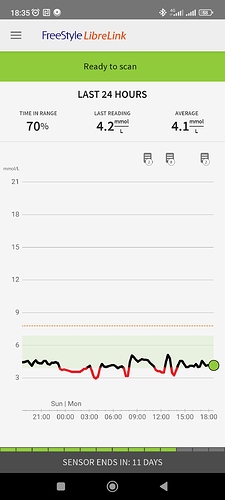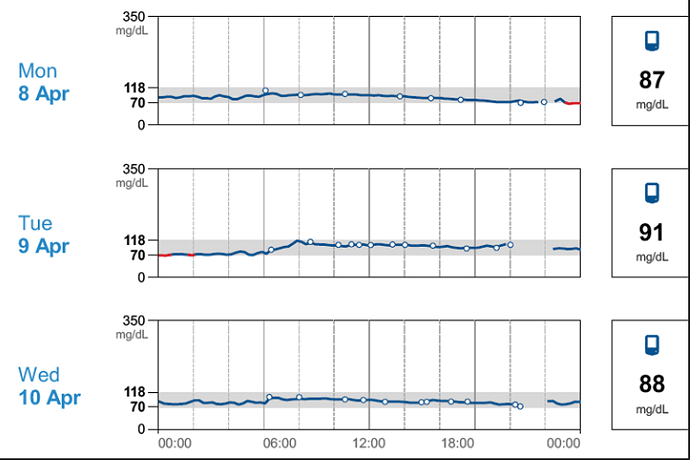I’ve picked up a freestyle libre 2 on their free trial and I’d like some opinions on the best way people have used it. I don’t have diabetes and I don’t plan to continue using it on a regular basis, but I’d like to squeeze the most info out of it I can. I eat mostly carnivore, but am subject to carb addiction so I’m not always particularly strict. So far it’s shown me that alcohol drops my blood sugar, biscuits spike it big time and I have random low sugars at night, without a Dawn phenomenon rise. I’ve been wearing it for 2 days, so have another 12 days to play with it.
CGM best use?
Just watching how eating this or that affects your interstitial fluid glucose levels can be very instructive. You may want to fast for a day and see how that works for you.
You say you occasionally smash biscuits and other carbs. The CGM will give you real-time feedback on how doing this affects your body. Without the CGM, it’s easy to tell yourself stories, but actually being able to see that sugar spike can make a real difference and dissuade you from doing it again.
I reckon the best use of the CGM is to do your level best to keep it “pancake flat.” It almost gamifies low carb eating. It’s also helped me pick up accidental carb intake, like when I had a frittata at a party and only when I saw my BG spike did I ask the host and they confirmed that it was made from a packet. It taught me to be much more careful about what I consume – which may seem obvious when stated this way, but it’s not so obvious in real life.
Good luck!
That’s interesting that you have no Dawn phenomenon, that alone is worth it. My lowest blood sugar was always at night.
I could never test the alcohol hypothesis, as I drink only right before bed, and my blood sugar is low then anyway.
Biscuits = cookies? Or US biscuits (basically a bread)?
Can you eat high protein, low fat? Eat high fat, low protein? (My blood sugar does not budge for either of these.)
UK biscuits. Bourbons are my curse as work provides them, plus the sweets and cake the parents bring in. The downside of being a nurse.
My levels generally seem pretty flat, except for the overnight dips to about 3mmol. As long as I avoid the biscuits of course. Average BM is trending at about 4.1 at the moment. Oh, and I did a half hour of zone 2 rowing today. That dropped my sugars as well, down to 3.4. My body doesn’t seem to be textbook.
As long as your body is making ketones (which it is, if your carbohydrate intake is low), then your serum glucose can go quite low, with no ill effects, because the brain is quite happy to metabolise ketones (fatty acids cannot cross the blood-brain barrier, but ketones are small enough). This was shown by the work of George Cahill, who proved this on his fasting subjects, by using a hyperinsulinaemic euglycaemic clamp (highly unethical, even back in the 1960’s, but as Dr. Stephen Phinney says, “The only people who were shaking and sweating were the ones in the lab coats;” the study participants were fine).
That is interesting, as my blood sugar tends to go up with exercise. I have heard other say that aerobics drops theirs. Back when I had my CGM, I was only doing weights or HIIT. It would be interesting to test jogging to see what happens.
3 mmol/l is a bit low, but not bad, especially since 4.1 is average. I was more like 5.5 in the morning, then mid 4s in the evening.
I’d use it for the only thing it’s actually good for, seeing how fast you recover from both transient rises and spikes (meaning and actual spike) when/if they happen.
People worry too much about things that don’t matter. We already know that different carbs will create different responses depending on how glycemic they are, I couldn’t care less how my BG rises to foods that are good as a whole. I also don’t care if it spikes from 70-180 because I ate some trash that I know I shouldn’t, but what I (do) care about, is how my body responds to that and how quick it’s able to return me to baseline, which is a real life example of how Insulin sensitive I am, and CGM’s are awesome at that!
A1C’s are ok, and I still like checking mine a couple times a year, I get an LP-IR as part of my yearly from my Doc which is nice, but those charts the CGM will give you show you real life example that you can correlate back to foods (assuming you’re tracking) and see not an average over time, but REAL recovery. That I’d be really interested in doing. I had a CGM for a while and totally screwed that up, was concerned about my sugar levels and wasn’t thinking about recovery and that being the real data I needed.
Even now doing CKD/TKD my A1C is usually around 5.1 and my LP-IR came back as <25, but I’d still like to do some testing around workout carbs to see what that does.
This is pretty standard on a ketogenic diet. You might have gone a bit lower than me at your very lowest, but not by much. Looking at the last 24 hours, I reckon you didn’t have any biscuits or anything in that period, is that right?
That’s much more variable than what I saw. I wonder if it’s a difference in software (I was using the Libre computer software) or an actual difference?
These go from midnight to midnight. The peak on Tuesday around 8 am was due to exercise. No exercise Monday or Wednesday.
Edit, to show how flat my response typically was. This was an OGTT (oral glucose tolerance) test in the morning, then normal eating during the day:



